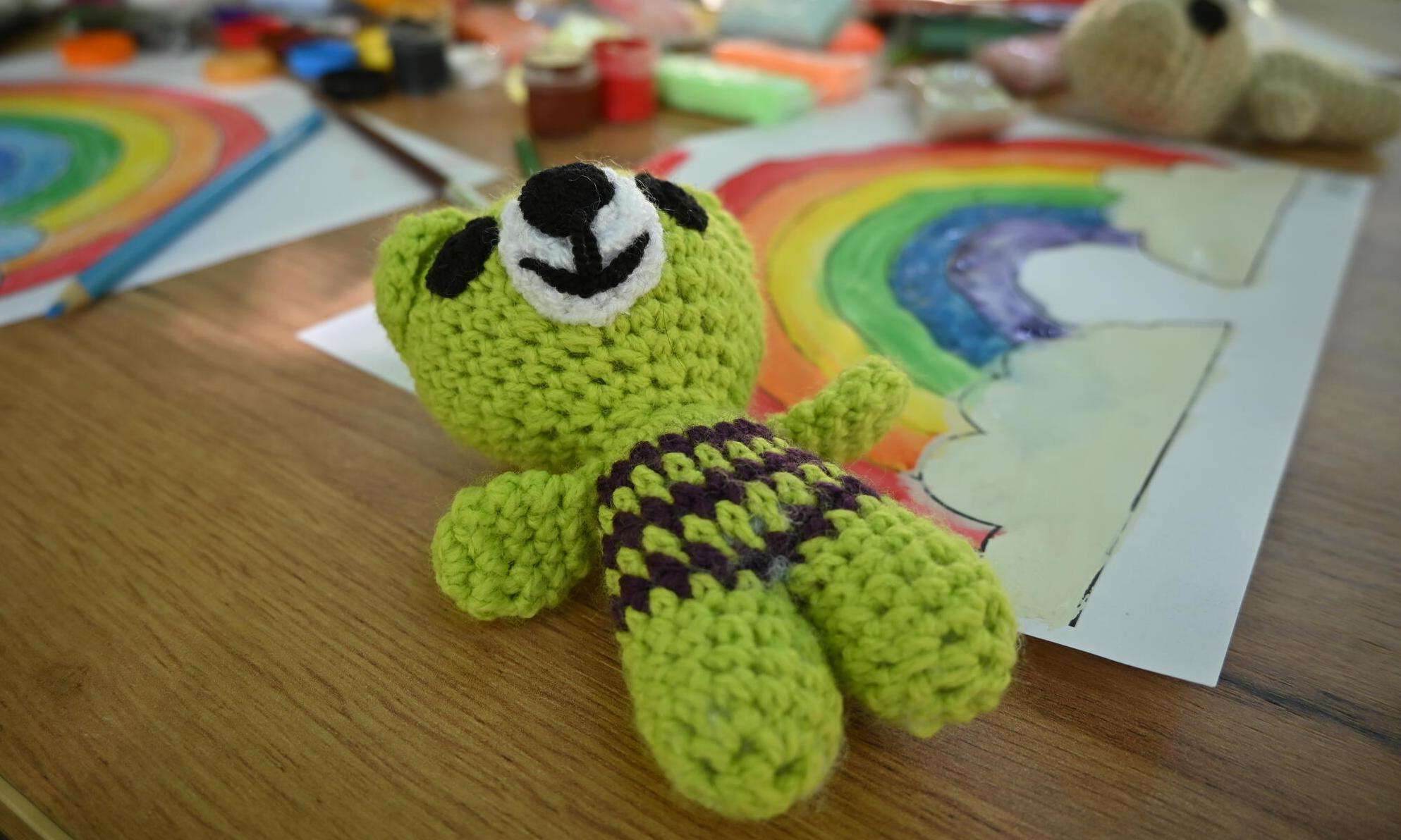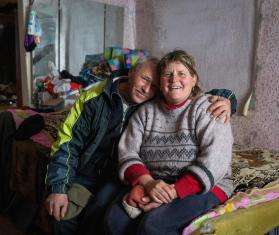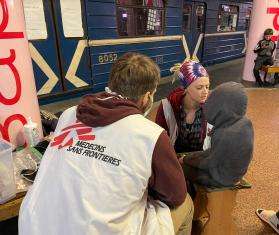“It was almost my birthday when the war broke out,” said Anatoliy Andriyevsky, a 72-year-old from the village of Myrolyubivka in Ukraine.
Anatoliy spent the day before his birthday hiding in cellars as Russian tanks tore through the village. “Of course, it was scary. You lie down and think: ‘who knows what will happen in the morning.’ You don’t know if you will wake up or not. Especially if you are alone. It’s good to have someone to talk to, but I was alone.”
When Anatoliy heard that Doctors Without Borders/Médecins Sans Frontières (MSF) was providing mental health support in his community, he started thinking about getting help. One of the main barriers he faced was the stigma associated with mental health disorders, especially in rural areas like his. MSF offers counseling for all members of the community, but most patients are older women.
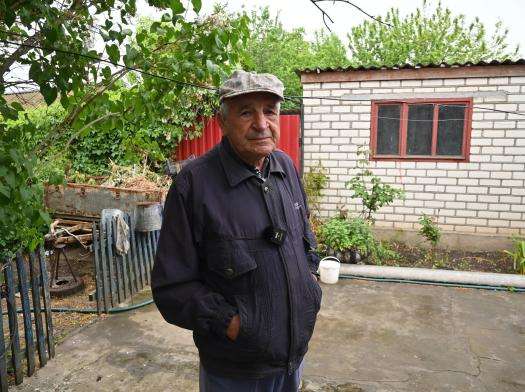
Ukraine 2023 © Yuliia Trofimova/MSF
“Men also feel powerless and helpless,” said MSF psychologist Tetiana Baranets. “Of course it affects their mental health. Their emotions need to be addressed because it affects both their families and themselves.”
MSF psychologists are responding to people’s mental health needs through psychological first aid, counseling, and comprehensive mental health care. In 2023 alone, MSF psychologists have provided more than 8,000 mental health consultations in seven different regions of Ukraine. MSF teams are also operating mobile clinics near the frontlines and in areas retaken by Ukrainian forces—often rural areas where people have experienced fighting, violence, and hostilities for months.
Helping Ukrainian children cope with war trauma
Psychological wounds can follow people even after fleeing to safer areas farther away from the front lines. In the city of Kropyvnytskyi, most MSF patients are women with children who are struggling to adapt to their new lives after being displaced by the war.
“This is Bonnie,” said Vanya, age 8, as he showed off his toy. “He is doing well, and he likes to sleep.”
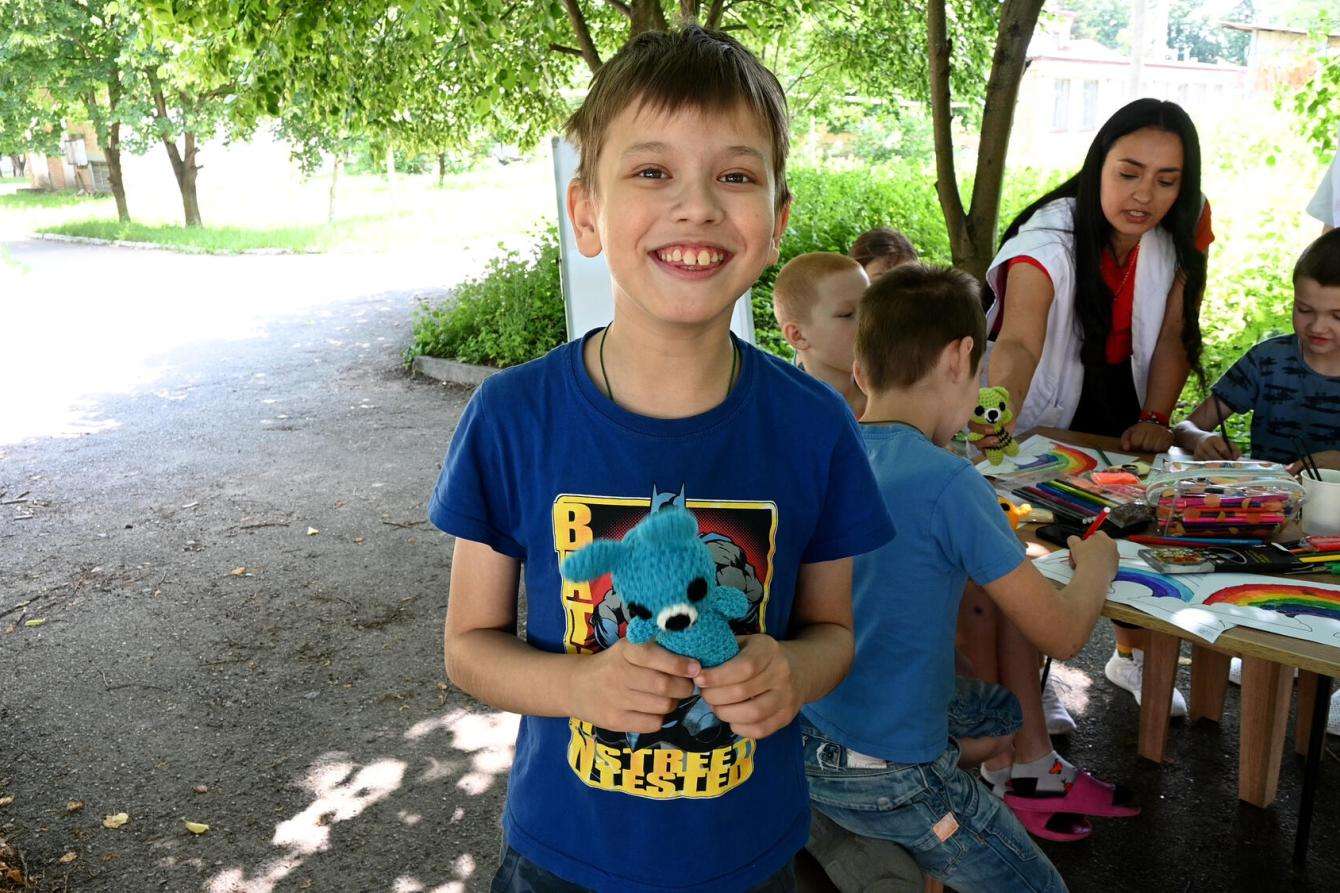
Vanya lives with his mother in a shelter for internally displaced people in the Kirovohrad region. MSF psychologists use toys like Bonnie to help Vanya process his emotions.
His family was evacuated from the Donetsk region in eastern Ukraine in August 2022. He, like many displaced children, misses his home, friends, teachers—a past life.
“Vanya used to feel very anxious at night,” said his mother, Olena Beda. “He was afraid of falling asleep. After talking to a psychologist, it became easier.”
Most MSF patients in Kirovohrad show symptoms related to anxiety or depression. To support them in developing coping skills, MSF psychologists provide both individual and group mental health sessions for children, while also supporting their family members. From January to April this year, MSF teams held over 1,000 group sessions for patients in Kirovohrad, helping them through mental health issues including anxiety, intrusive thoughts, and trauma, and teaching them coping skills like stress management.
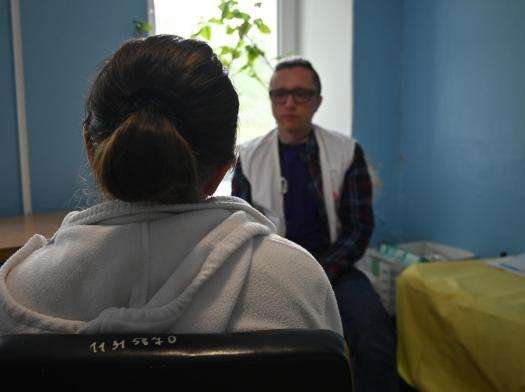
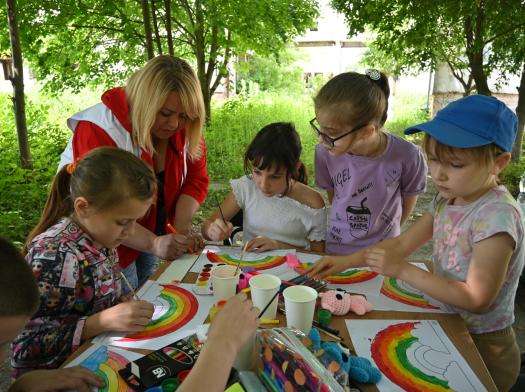
MSF mental health teams hold both individual and group therapy sessions, including sessions for children coping with trauma due to the war. Ukraine 2023 © Yuliia Trofimova/MSF
“We work with children based on their individual needs,”said MSF psychologist Svitlana Alekseenko. “We play and draw, we help them overcome fear and negative emotions related to what they have experienced.”
Group therapy can support the whole community, as well. MSF psychologists are educating patients and community members on the benefits of psychological aid, creating a more supportive environment for people experiencing mental health issues and a wider understanding of the benefits of mental health care.
Psychological first aid for emergency response
While many Ukrainians have sought safety in the west of the country, missile strikes continue to endanger civilian lives and cause loss of life even far away from the frontlines. The physical threat of air strikes also impacts the mental health of people across the country.
In the aftermath of an attack, psychological first aid is essential to help people cope with shock, panic attacks, changes in appetite and sleep patterns, and withdrawal from daily activities, among other symptoms of distress.
In regions near the frontlines—such as Zaporizhzhia, Dnipropetrovsk, Donetsk and Kherson—MSF teams have responded to the acute psychological needs of people who have survived missile strikes or other disasters. After a missile strike in Zaporizhzhia this year, for example, MSF psychologists responded.
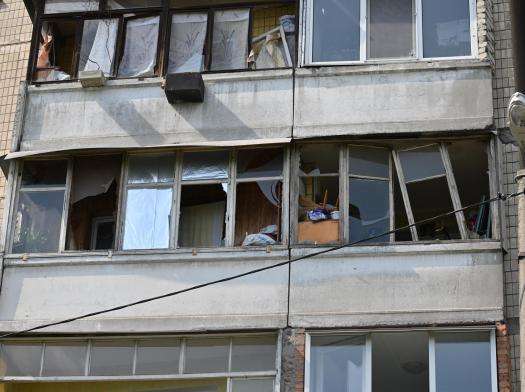
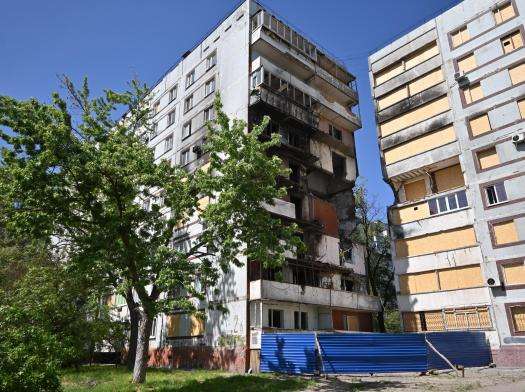
From left: a damaged building in Dnipro and a residential building in Zaporizhzhia where MSF responded after an airstrike in March. Ukraine 2023 © Yuliia Trofimova/MSF
After an airstrike, the first thing MSF mobile clinic teams do once they arrive on site is identify people already facing the psychological impact. Receiving timely and proper support can reduce a person’s recovery time from a traumatic event.
"The most important [thing] is to establish contact with the person and make clear that they see you, hear you, and understand where they are,” explained MSF psychologist Inna Potapenko. “We always pay attention to those who sit in silence, because it’s clear that this is a state of unresponsiveness which a person needs to be brought out of.”
Peer support and specialized mental health care
For some, one or two counseling sessions aren’t enough. Long-term and specialized care may be needed to decrease the chances of developing mental health disorders and additional symptoms, as well as to support their ability to maintain relationships and prevent isolation.
In the Kyiv region, MSF provides comprehensive mental health care to people who have faced torture or ill-treatment. During group and individual sessions, patients can share their emotions with others who have had similar experiences.
“Psychological violence can be more challenging than physical violence,”said Andryi Verbich, who faced torture and ill-treatment while he was held by Russian armed forces.
“The constant exposure to loud propaganda in [my] cell makes it difficult to communicate and overwhelms the mind,” he adds, “It makes it feel like you are losing your sanity.”
In Hostomel, those who have experienced violence and trauma often feel excluded from their community and can become isolated. The combination of group and individual mental health sessions can support their sense of self and community.
“As humans, we are unique and not defined solely by our negative experiences. Our impact goes beyond that,” said MSF psychologist Mariyana Kviatkovska. “People often forget this and find themselves living only in their traumatic memories. Life becomes divided into “before” and “after,” and they feel trapped in that vacuum.”

Ukraine: MSF denounces repeated shelling of Kherson hospital
Read moreMental health is a key challenge for Ukraine’s health care system
Ukraine’s health care system is leading initiatives to promote mental health and care services, but nevertheless, the war has had a devastating psychological impact for Ukrainians. While some are able to adapt on their own, the more a person is exposed to various traumatic events, the higher their chances of developing long-term, serious mental health issues.
It can be difficult for some Ukrainians to access timely care, however, due to the lack of psychologists and counselors, the stigma associated with mental health, and the reality of ongoing fighting in some regions. Without timely and proper psychological support, issues can develop into long-term post-traumatic stress disorder (PTSD), anxiety, and depression, and can significantly a person’s quality of life, long after experiencing the traumas of war.
